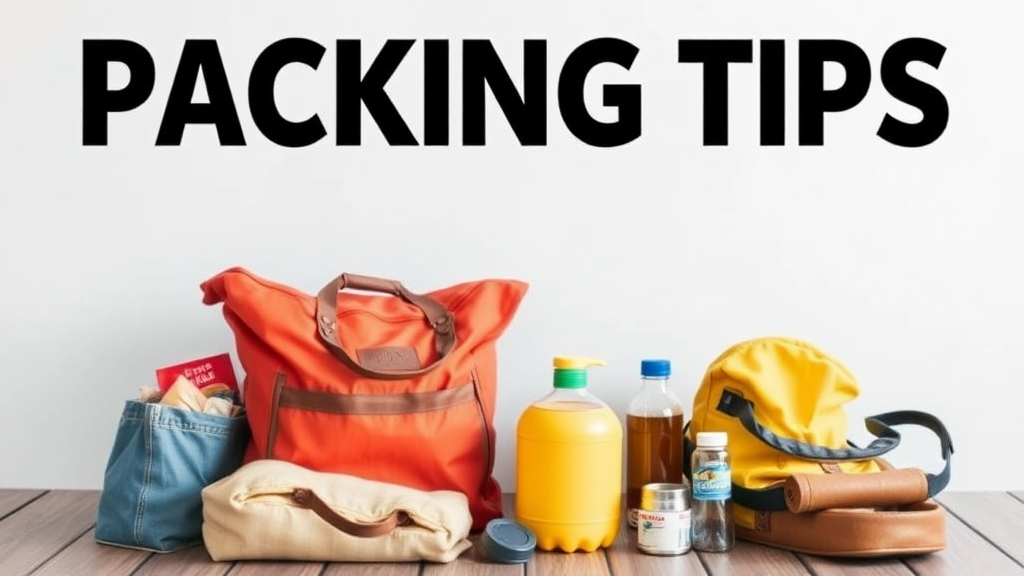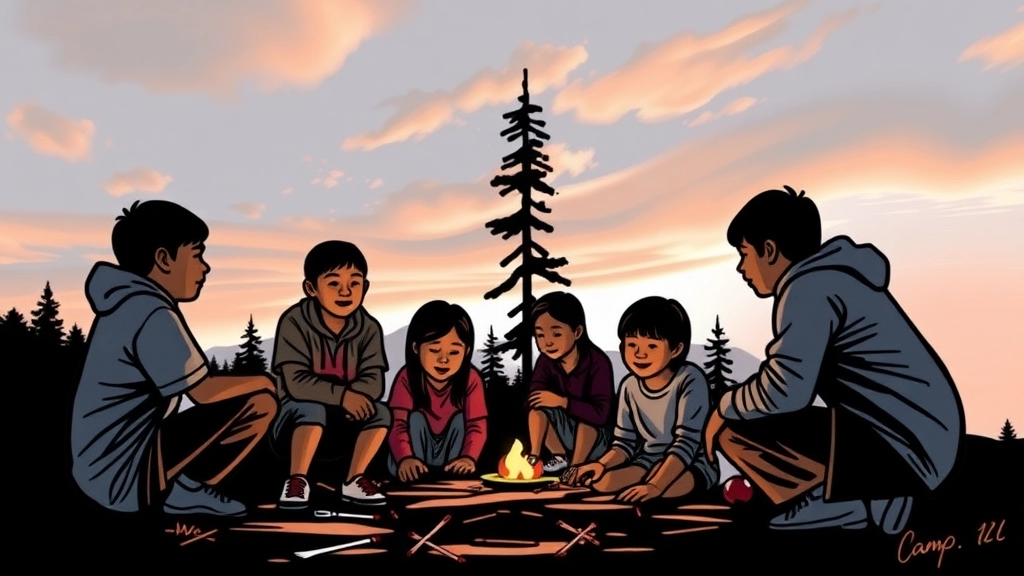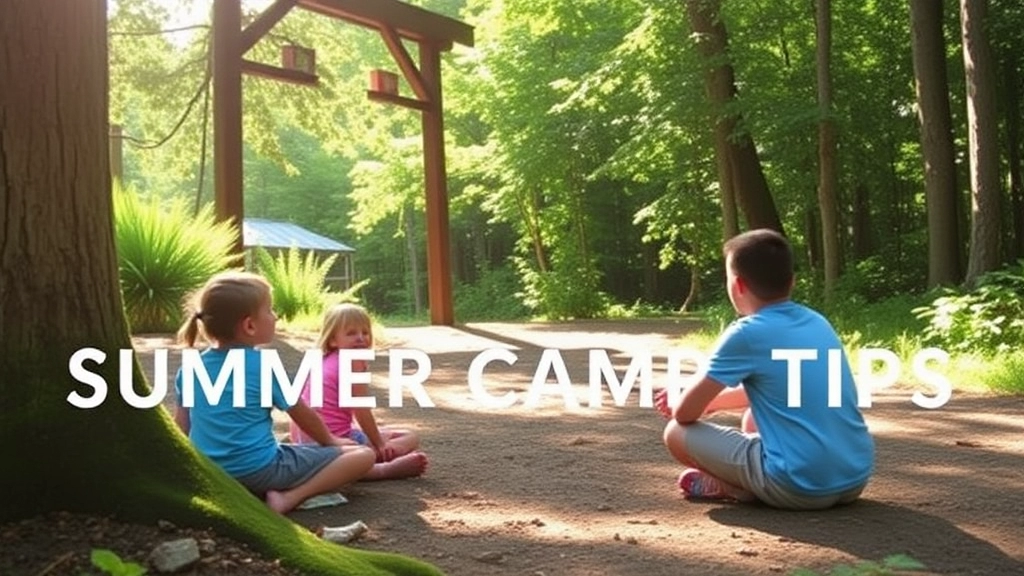Summer Camps: A Transformative Experience
Summer camps can be a transformative experience for children, offering them opportunities to learn new skills, make lifelong friends, and build independence. However, preparing for camp can be a daunting task for parents. From choosing between sleepaway and day camps to handling medical needs and packing efficiently, there are many factors to consider. This article provides comprehensive summer camp tips to help you navigate these challenges and ensure your child has a memorable and enriching experience.
Guiding You Through the Process
We’ll guide you through the entire process, starting with selecting the right camp based on your child’s interests and emotional readiness. You’ll find essential packing tips, strategies for managing technology and valuables, and advice on how to stay in touch without distracting from the camp experience. We also address common concerns like preparing for potential homesickness and handling medical needs at camp. By the end of this article, you’ll be equipped with all the knowledge you need to make your child’s summer camp adventure a success.
Choosing Between Sleepaway or Day Camps
Choosing between sleepaway or day camps can feel like a monumental decision. Trust me, I get it. You’re probably wondering: âWill my kid be okay away from home for that long?â or âIs a day camp enough to keep them engaged?â Let’s break it down and make this choice easier.
What Are Your Child’s Needs?
First off, think about your child’s personality and needs. Some kids thrive in a sleepaway camp environment, loving the idea of being away from home and diving into new adventures. Others might get homesick or just prefer the comfort of their own bed at night. Here are a few questions to consider:
- How independent is your child? If they’re already quite self-sufficient, sleepaway camp might be a great fit.
- Do they have any special needs or medical conditions? Day camps might be easier to manage in this case.
- What’s their social comfort level? If they’re shy, a day camp could help ease them into social settings without the pressure of overnight stays.
Benefits of Sleepaway Camps
Sleepaway camps offer a unique set of benefits:
- Building Independence: Kids learn to take care of themselves, make decisions, and solve problems without immediate parental guidance.
- Deep Friendships: Spending 24/7 with peers can forge deep, lasting friendships.
- Immersive Experience: They get to fully immerse themselves in activities without the daily interruptions of home life.
Benefits of Day Camps
On the flip side, day camps have their own perks:
- Routine and Comfort: Kids return home each evening, which can be comforting for both them and you.
- Flexibility: They can still participate in family activities and other local events.
- Cost-Effective: Generally, day camps are less expensive than sleepaway camps.
Real Stories
Let’s keep it real. My friend Sarah’s kid, Jake, was super excited about sleepaway camp. But after a week, he was miserable and homesick. They switched to a day camp the next year, and he thrived. On the other hand, Emma’s daughter, Lily, couldn’t wait to go back to sleepaway camp every year. She loved the independence and made friends she still keeps in touch with today.
Making the Decision
Ultimately, the best camp for your child depends on their individual needs and your family’s circumstances. Here’s a quick checklist to help you decide:
- Talk to your child: Get their input on what they’re excited or nervous about.
- Visit camps: If possible, visit both types of camps to get a feel for the environment.
- Start with a day camp: If you’re unsure, starting with a day camp can be a good way to test the waters.
For more detailed guidance on planning your child’s summer camp experience, check out our ultimate guide to summer camp planning.
Selecting the Right Camp Based on Interests

Alright, let’s talk about picking the right camp for your kid.
Ever wondered if your child would thrive more in a sports camp or an arts camp?
It’s a common dilemma.
Here’s the deal: interests matter.
Why Interests Are Key
Imagine sending a bookworm to a football camp. Not a great fit, right?
Your child’s happiness and engagement hinge on their interests.
How to Pinpoint Their Interests
Ask them directly. Simple, but effective.
- What activities do they enjoy at home?
- What clubs or teams are they part of at school?
- Have they shown interest in trying something new?
Types of Camps
There’s a camp for almost everything. Here’s a quick rundown:
Sports Camps: For the athletic kids who love to run, jump, and compete.
Arts Camps: Perfect for creative minds who live for painting, acting, or music.
Science Camps: For the curious ones who can’t stop asking “why?”
Adventure Camps: Ideal for thrill-seekers who love the great outdoors.
Specialty Camps: Think coding, cooking, or even magic.
Real-Life Example
My mate’s kid, Tom, was a Lego genius. They found a camp focused on engineering and building. Tom had the summer of his life, and now he’s considering a future in engineering.
Making the Final Decision
Visit the camp’s website. Look for:
- Daily schedules
- Activity lists
- Testimonials
- Photos and videos
Talk to other parents. Word-of-mouth is gold.
Consider a trial day. Some camps offer a day or weekend trial.
Preparing Your Child Emotionally for Camp
Alright, let’s get real. Preparing your child emotionally for camp can feel like a big deal. You’re probably asking yourself, “Will they be okay without me?” or “What if they get homesick?” Trust me, you’re not alone. Every parent has these worries. So, let’s break it down and make it easy.
Start the Conversation Early
First things first, talk to your child about camp. Get them excited! Share stories about your own camp experiences if you have any. If you don’t, no worriesâjust talk about all the fun activities they’ll get to do.
- Ask them what they’re excited about: Swimming, making new friends, trying new activities?
- Address their fears: What are they worried about? Missing home? Not knowing anyone?
Visit the Camp Together
If possible, visit the camp beforehand. This helps demystify the place and makes it less intimidating. Walk around, meet some of the staff, and check out the facilities.
- Show them where they’ll sleep: Knowing their living space can make them feel more secure.
- Tour the activity areas: Let them see the swimming pool, the sports fields, and the dining hall.
Role-Playing Scenarios
Kids can get anxious about the unknown, so role-playing common camp scenarios can be super helpful.
- Practice introducing themselves: This can help break the ice with new friends.
- Go over what to do if they feel homesick: Teach them to talk to a counsellor or write a letter home.
Pack Comfort Items
Sometimes, a little piece of home can make all the difference. Pack a few comfort items like a favourite stuffed animal, a family photo, or even a special blanket.
- Label these items: Make sure they don’t get lost among the hustle and bustle of camp life.
Encourage Independence
Before camp, start giving your child more responsibilities at home. This builds their confidence and independence.
- Let them pack their own bag: With your guidance, of course.
- Give them small chores: Like making their bed or setting the table.
Open Communication
Make sure your child knows it’s okay to talk about their feelings. Reassure them that feeling nervous is normal and that everyone else is probably feeling the same way.
- Set up a communication plan: Maybe they can write you letters or have a scheduled phone call.
For more tips on making your child’s camp experience unforgettable, check out our guide on planning your ultimate summer camp. Also, discover some fun games for an unforgettable summer camp to get them even more excited!
Essential Packing Tips for Summer Camp

Alright, folks, let’s talk about packing for summer camp.
This is where the rubber meets the road.
You’ve got questions. I’ve got answers.
What Do I Pack for Summer Camp?
First off, don’t overthink it.
But also, don’t underthink it.
You want your kid to be prepared, but not hauling a suitcase bigger than them.
The Basics:
- Clothing:
- T-shirts
- Shorts
- Swimwear
- Pyjamas
- A jumper or two for chilly nights
- Footwear:
- Trainers
- Flip-flops
- Waterproof boots (if it’s a rainy area)
- Toiletries:
- Toothbrush and toothpaste
- Shampoo and conditioner
- Soap or body wash
- A comb or hairbrush
- Bedding:
- Sleeping bag
- Pillow
- Extra blanket (just in case)
Special Items:
- Sunscreen: It’s a must. Sunburn is no joke.
- Insect Repellent: Keep those mozzies at bay.
- Water Bottle: Staying hydrated is key.
- Torch: For those late-night loo runs.
Packing Tips to Make Life Easier
Label Everything.
Kids lose stuff.
It’s a fact of life.
Use a permanent marker or those nifty iron-on labels.
Pack Smart.
Roll clothes instead of folding.
Saves space and keeps things neat.
Ziplock Bags.
These are your best friends.
Use them for toiletries, snacks, or wet swimwear.
Stories from the Trenches
I remember my first summer camp.
I packed like I was moving house.
Big mistake.
I ended up wearing the same three outfits on rotation.
Handling Medical Needs and Allergies at Camp
Alright, let’s tackle a big concern for many parents: handling medical needs and allergies at camp. It’s a real worry, right? You’re sending your kid off to have fun, but you need to make sure they’re safe and sound. Let’s break it down so you can breathe easy.
What Are Your Main Concerns?
First things first, what’s keeping you up at night? Maybe it’s:
- Food allergies: Will the camp cater to your child’s dietary restrictions?
- Medications: Will they remember to take their meds on time?
- Emergency procedures: What if something goes wrong?
These are legit concerns, so let’s get into how to handle them.
Choose the Right Camp
Not all camps are created equal, especially when it comes to medical care. Here’s what you need to look for:
- Qualified medical staff: Is there a nurse or doctor on site?
- Emergency protocols: What’s their plan if something happens?
- Experience with allergies: Have they handled allergies or medical conditions before?
Prep the Camp Staff
Communication is key. Make sure the camp staff knows everything they need to about your child’s medical needs:
- Detailed medical forms: Fill these out thoroughly.
- Face-to-face meeting: If possible, meet with the camp nurse or director.
- Emergency contacts: Make sure they have multiple ways to reach you.
Pack Smart
You’ve got to pack like a pro. Here’s a checklist to make it easy:
- Medications: Enough for the entire camp duration, plus some extra.
- EpiPens or inhalers: If your child needs them, pack multiples.
- Medical ID bracelet: This can be a lifesaver in emergencies.
- Instruction sheet: Clear, simple instructions on what to do in case of an emergency.
Teach Your Kid
Your child needs to be in the loop too. Empower them with knowledge:
- Recognising symptoms: Teach them how to spot the signs of an allergic reaction or medical issue.
- Speaking up: Encourage them to tell an adult if they feel unwell.
- Using meds: Make sure they know how to use their EpiPen or inhaler.
Real-Life Example
Let’s say your child has a peanut allergy. You’ve done your homework and found a camp that’s peanut-free. You’ve met with the camp nurse, packed extra EpiPens, and taught your kid to recognise the signs of an allergic reaction. You’re feeling pretty good, right? But what if there’s a slip-up?
That’s where the camp’s emergency protocol comes in. They should have a clear plan for getting your child immediate medical attention. And because you’ve packed smart and prepped your kid, everyone knows what to do.
Stay Connected
Finally, make sure you’re reachable. Give the camp multiple ways to contact you and have a plan for checking in:
- Scheduled calls: Agree on a time for regular updates.
- Emergency numbers: Provide more than one contact number.
For more tips on making sure your child is prepared, check out our guide on Skills for Summer Camp Success. And if you’re looking for camps that are well-equipped to handle medical needs, our Why Summer Camps Matter for Kids’ Growth article is a great resource.
Building Independence at Camp

Ever wondered how to help your kid build independence at camp?
It’s a big deal.
You want them to grow, but not feel abandoned.
Here’s the thing: camps are perfect for fostering independence.
But how do you make sure it works?
Start Small at Home
Before camp, give them some responsibilities.
- Chores: Simple tasks like making their bed.
- Decision-Making: Let them choose their outfits.
- Problem-Solving: Encourage them to solve minor issues on their own.
These small steps build confidence.
Pack with Purpose
Involve your child in packing.
- Checklist: Create a list together.
- Organize: Teach them to pack logically.
- Label: Use labels for easy identification.
This gives them a sense of ownership.
Encourage Social Skills
Social skills are crucial.
- Role-Playing: Practice conversations and scenarios.
- Group Activities: Enrol them in group sports or clubs.
This preps them for camp interactions.
Set Expectations
Talk about camp routines.
- Daily Schedule: Explain the typical day at camp.
- Rules: Discuss camp rules and why they matter.
- Challenges: Prepare them for potential challenges.
Setting expectations reduces anxiety.
Share Stories
Share your own camp stories.
- Successes: Talk about the fun and friendships.
- Challenges: Be honest about the tough parts and how you overcame them.
Stories make it relatable.
Stay Positive
Your attitude matters.
- Confidence: Show confidence in their ability to handle camp.
- Support: Reassure them that you’re always there for support.
Positivity is contagious.
Follow Up
After camp, discuss their experience.
- Highlights: Ask about the best parts.
- Challenges: Talk through any difficulties.
- Growth: Highlight how they’ve grown.
This reinforces their achievements.
Building independence at camp isn’t rocket science.
It’s about preparation, encouragement, and support.
And trust me, it’s worth it.
Your kid will come back stronger and more confident.
That’s the magic of camp.
Ready for Camp?
If you’re still on the fence, check out our guide on Choosing Between Sleepaway or Day Camps.
Need packing tips? We’ve got you covered with Essential Packing Tips for Summer Camp.
How to Label and Organise Camp Gear
Ever sent your kid off to camp and worried if they’ll come back with everything you packed? Yeah, me too. Labelling and organising camp gear isn’t just about making sure your child doesn’t lose their favourite hoodie; it’s about making their camp experience smoother and less stressful. Let’s dive into some practical tips to keep your kid’s gear in check.
Why Labelling Matters
First off, why bother labelling? Well, imagine a sea of identical backpacks, water bottles, and sleeping bags. Without labels, your kid’s stuff is as good as lost. Plus, it helps camp staff return misplaced items to the right camper.
Essential Labelling Tips
- Use Durable Labels: Go for labels that can withstand the rigours of camp life. Think waterproof, tear-resistant, and easy to read.
- Label Everything: From socks to sleeping bags, everything should have your child’s name on it. Trust me, even the smallest items tend to disappear.
- Permanent Markers and Label Makers: Invest in a good permanent marker or a label maker. These tools are lifesavers.
- Iron-On Labels for Clothes: These are fantastic for clothes. They stay put even after multiple washes.
- Name Tags for Bags and Backpacks: Attach sturdy name tags to bags and backpacks. Bonus points if they’re colourful and easy to spot.
Organising Camp Gear
Now, onto the organisation. You want your child to find their stuff easily and keep their space tidy. Here’s how:
- Packing Cubes: These are a game-changer. Use different coloured cubes for different types of itemsâone for clothes, one for toiletries, and so on.
- Ziploc Bags: Perfect for smaller items like toiletries, snacks, or even socks and underwear. They’re also great for keeping things dry.
- Checklist: Create a packing checklist and go through it with your child. This not only helps in packing but also ensures they know what they’ve brought.
- Laundry Bag: Send a laundry bag for dirty clothes. It keeps the clean stuff from mingling with the dirty.
- Daily Outfit Bags: For younger kids, consider packing daily outfits in separate bags. It simplifies their morning routine.
Real-Life Example
I remember when I sent my niece to camp for the first time. We used packing cubes and labelled every single item. She came back with everything, and the camp staff even complimented her on how organised she was. It made her feel more confident and less anxious about being away from home.
Internal Linking Opportunity
For more tips on preparing your child for camp, check out our Ultimate Guide to Kids Summer Camps. And if you’re looking for a comprehensive packing guide, don’t miss our Ultimate Summer Camp Packing Checklist.
Managing Technology and Valuables

Worried about how to handle your kid’s tech and valuables at camp?
You’re not alone.
Let’s dive in.
Why Bother?
First off, camps are about unplugging.
Kids should be soaking up the outdoors, not glued to screens.
But let’s be real, some tech is unavoidable.
What to Bring and What to Leave
Here’s a quick rundown:
- Mobile Phones: Most camps have strict rules. Check the camp’s policy.
- Cameras: A simple, inexpensive camera is fine. No need for the latest DSLR.
- Watches: A basic watch can help kids keep track of time.
- Valuables: Leave expensive jewellery and gadgets at home.
Storage Solutions
If your child must bring something valuable, make sure they have a secure place to store it.
- Lockboxes: Some camps provide these.
- Lockable Bags: A small lock for their bag can offer peace of mind.
Insurance and Labelling
Consider insuring valuable items.
Label everything with your child’s name.
A simple label can save a lot of hassle.
Real Talk: Stories from the Campfire
I remember a parent telling me how their kid lost a brand-new phone on the first day.
They spent the rest of the camp worrying instead of having fun.
Don’t let this be you.
Managing technology and valuables at camp doesn’t have to be a headache.
Keep it simple.
Keep it safe.
And most importantly, keep the focus on the experience, not the gadgets.
Got more questions about preparing for camp? Check out our other tips on Essential Packing and Building Independence.
Happy camping!
Staying in Touch Without Distracting from the Experience
Ever wondered how to stay connected with your kid while they’re off at camp without becoming a helicopter parent? It’s a real concern for many of us. You want to make sure they’re okay, but you also don’t want to ruin their experience by constantly checking in. So, how do you strike the right balance?
Why Staying in Touch Matters
Let’s be real, the thought of your child being away from home can be nerve-wracking. Staying in touch helps ease that anxiety for both you and your child. But here’s the kicker: too much contact can actually disrupt their camp experience. The goal is to let them enjoy their independence while still feeling connected to home.
Set Clear Communication Expectations
Before camp even starts, have a chat with your child about how often you’ll communicate. This sets the stage and avoids misunderstandings later. Here’s a quick list of things to discuss:
- Frequency: Decide how often you’ll call or write letters. Maybe once a week is a good starting point.
- Method: Will it be phone calls, emails, or good old-fashioned letters? Some camps even have specific rules about this, so check beforehand.
- Timing: Pick a time that doesn’t interfere with camp activities. Maybe after dinner or during free time.
Use Letters and Emails
Letters and emails are a great way to keep in touch without being intrusive. They allow your child to read and respond at their own pace. Here’s why they work:
- Non-intrusive: Your child can read them whenever they have free time.
- Keepsakes: Letters can be kept as mementoes, something they can look back on fondly.
- Thoughtful: Taking the time to write a letter shows you care, and it’s more meaningful than a quick text.
Phone Calls: Less is More
Phone calls can be tricky. While hearing your child’s voice can be reassuring, too many calls can make them more homesick. If you do opt for phone calls, keep these tips in mind:
- Short and Sweet: Keep the calls brief to avoid making them miss home too much.
- Positive Vibes: Focus on the fun they’re having rather than what they’re missing at home.
- Scheduled: Stick to a schedule so your child knows when to expect your call.
Avoid Social Media
This one’s a bit controversial, but hear me out. Social media can be a huge distraction. If the camp allows phones, encourage your child to limit their social media use. Here’s why:
- Distraction: Constant notifications can pull them out of the camp experience.
- Comparison: Seeing what friends are doing at home can make them feel left out.
- Privacy: Camps often have rules about posting photos or videos, so it’s best to check those first.
Emergency Contact Only
Make it clear that if there’s an emergency, the camp will contact you. This helps you resist the urge to constantly check in. Trust the camp staff to handle minor issuesâthey’re pros at this.
Real-Life Example
I remember when my niece went to camp for the first time. My sister was a wreck, constantly wanting to call and check in. Instead, she wrote a letter every other day. My niece loved it! She felt connected but not smothered. By the end of camp, she had a stack of letters she cherished, and my sister had peace of mind.
Conclusion
Staying in touch without distracting from the experience is all about balance. Set clear expectations, use letters and emails, limit phone calls, and avoid social media. Trust me, your child will thank you for it. After all, the goal is to help them build independence while knowing you’re just a letter away.
For more tips on making your child’s camp experience memorable, check out our Summer Camp Checklist.
Preparing for Potential Homesickness
Homesickness. It’s a real worry, isn’t it?
Your kid’s heading off to camp, and you’re wondering, “Will they be okay without me?”
I’ve been there.
Let’s dive into some tips to help your child (and you) handle homesickness like a pro.
Talk About It Beforehand
Start the conversation early.
Let them know it’s normal to miss home.
Share your own stories about times you felt homesick and how you coped.
Pack Comfort Items
A favourite teddy, a family photo, or even their own pillow.
These small items can bring a huge sense of comfort.
Establish a Communication Plan
Agree on how often you’ll check in.
Letters? Emails? Maybe a scheduled call?
Just make sure it’s not too frequentâlet them immerse in the camp experience.
Encourage Independence
Give them tasks at home to build confidence.
Packing their own bag is a great start.
Stay Positive
Your attitude will set the tone.
If you’re anxious, they’ll pick up on it.
Stay upbeat and excited about their new adventure.
Use Camp Resources
Most camps have staff trained to handle homesickness.
Don’t hesitate to reach out for their advice and support.
Practice Short Separations
Have them spend a night at a friend’s or relative’s house.
It’s a mini-camp experience that can ease the transition.
Set Realistic Expectations
Let them know it’s okay to feel sad sometimes.
But also remind them of all the fun activities and new friends they’ll make.
Reassure, But Don’t Rescue
If they call you in tears, listen and comfort them.
But avoid the “I’ll come get you” promise unless it’s absolutely necessary.
Follow Up After Camp
Talk about their experience.
What did they love? What was hard?
This helps them process and prepares them for next time.
Homesickness is part of growing up.
But with the right prep, your child can handle itâand come out stronger.
Got more questions about camp prep? Dive into our other guides on Packing Tips for Summer Camp and Building Independence at Camp.
Ready to send them off? They’ve got this. And so do you.
FAQs about Summer Camp Tips
How do I select the right camp for my child?
Choosing the right camp involves considering your child’s interests. Ask them directly about their preferences and observe what activities they enjoy at home or at school. There are various types of camps such as sports, arts, science, adventure, and specialty camps. Make sure to visit the camp’s website, talk to other parents, and consider a trial day if available.
What should I pack for summer camp?
When packing for summer camp, focus on the essentials. Include clothing like T-shirts, shorts, swimwear, and pyjamas. Don’t forget footwear like trainers and flip-flops, and toiletries such as toothbrush, toothpaste, and shampoo. Special items like sunscreen, insect repellent, and a water bottle are also important. Label everything and pack smart by rolling clothes and using ziplock bags.
How can I help my child build independence at camp?
Fostering independence starts at home. Give your child responsibilities like chores, decision-making tasks, and problem-solving opportunities. Involve them in packing by creating a checklist together and organizing their items. Encourage social skills through role-playing and group activities, set clear expectations about camp routines, and share your own camp stories to make it relatable. Stay positive and follow up after camp to discuss their experiences and growth.
How should I manage my child’s technology and valuables at camp?
Camps are a great opportunity for kids to unplug and enjoy the outdoors. Check the camp’s policy on mobile phones and consider leaving expensive gadgets at home. If necessary, send a simple camera and a basic watch. Ensure valuable items are securely stored, either in lockboxes provided by the camp or lockable bags. Label everything and consider insuring valuable items to avoid any hassle.
Why are interests important when selecting a camp?
Interests are crucial because they directly impact your child’s happiness and engagement at camp. Sending a child to a camp that aligns with their interests ensures they have a fulfilling and enjoyable experience.
What types of camps are available?
There are various types of camps to cater to different interests:
- Sports Camps: For kids who love athletic activities.
- Arts Camps: Ideal for creative children interested in painting, acting, or music.
- Science Camps: Perfect for curious minds who enjoy exploring and learning.
- Adventure Camps: Great for thrill-seekers who love outdoor activities.
- Specialty Camps: Focused on specific skills like coding, cooking, or magic.
What are some packing tips to make life easier?
Label everything to avoid lost items, pack smart by rolling clothes to save space, and use ziplock bags for toiletries, snacks, or wet swimwear. These tips ensure a more organized and efficient packing process.
How can I prepare my child for the camp experience?
Prepare your child by discussing the daily schedule, camp rules, and potential challenges they might face. Encourage them to participate in group activities and socialize. Share your own camp experiences to make it more relatable and set a positive tone.
References
-
Choosing the Right Camp for Your Child
-
Summer Camp Packing List
-
Managing Technology at Camp

